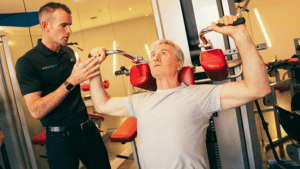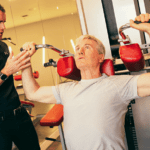TORONTO (CP) –
When it comes to exercise for older adults, the common wisdom has long been to “use it or lose it.” Now Canadian-led research has discovered there’s far more underlying that sage advice than previously believed.
Researchers have found that seniors who participated in weight training not only improved muscle strength and endurance – they actually reversed some of the effects of aging in certain muscle tissue at the cellular level.
In a study published online May 23rd 2007 in PLoS One – a journal of the Public Library of Science – the researchers found that energy-producing “mitochondria” in skeletal muscle cells can be revitalized with weight-training exercise, returning them to a state closer to those found in younger people.
Known as the “powerhouse of cells,” mitochondria are tiny structures that float around outside the nucleus of most cells. They allow cells to use oxygen to convert fat, protein and carbohydrates into energy. But it appears that as people add on the years, their mitochondria also age and become less efficient at burning nutrients to create energy.
“There’s accumulating evidence to show that mitochondria are involved in the aging process and if the mitochondria don’t work very well, the energy, the endurance and the strength of muscles become diminished,” study co-author Dr. Mark Tarnopolsky of McMaster University said from Hamilton.
To test the effects of exercise on muscles, the scientists had 25 active, healthy adults, with an average age of 70, perform an hour of arm, leg and core weight-training exercises twice a week for six months.
Biopsies of their thigh muscles were taken prior to the program’s commencement and at its conclusion and the mitochondrial “signature” analyzed. Similar tests were done on young, relatively sedentary adults (aged 20 to 35) who did no weight training.
The difference in the older subjects’ mitochondria before and after the exercise program was significant, said Tarnopolsky, director of McMaster’s Neuromuscular and Neurometabolic Clinic.
“The main, novel finding is that we could bring that aging mitochondria pattern back towards a younger person, almost reversing the aging signature, pretty much by 40, 45 years with six months of weight training,” he said.
“What’s cool about that is that this aging is reversible – maybe not 100 per cent – but at least at the (cellular) level, we’re seeing a significant reversal of accumulated damage over a long period of time.”
Co-investigator Simon Melov of the Buck Institute for Age Research in Novato, Calif., said the scientists were “very surprised by the results.”
Melov said the dramatic reversal “gives credence to the value of exercise, not only as a means of improving health, but of reversing the aging process itself, which is an additional incentive to exercise as you get older.”
Norman and Barbara Ford of Dundas, Ont., who took part in the 2005 study at nearby McMaster, said they definitely noticed a difference in their endurance while doing the exercise routine.
Norman Ford, 78, said he stays active looking after the grounds and pool at the couple’s home. But with the weight training, a day spent mowing and maintaining the property didn’t end with his sitting in front of the TV. He felt energetic enough to go for dinner and a show.
“You just could do your normal activities that you liked to do longer.”
His wife said she also felt stronger and had more stamina from the resistance training, which involved gradually increasing weights over time.
“My kids were really impressed with my arms,” said Barbara Ford, 72. “I had Popeye muscles.”
Measurements of muscle strength showed that before exercise training, the older adults were almost 60 per cent weaker than the younger adults; after training their strength improved by about 50 per cent, such that they were only 38 per cent weaker than the young adults in the study.
Dr. Ken Madden, a geriatric medicine specialist at the University of British Columbia, called the mitochondria finding “surprising.”
“It’s been generally given that you tend to lose muscle strength as you age, and part of that’s irreversible,” Madden, who also teaches medical classes at UBC, said from Vancouver.
“We always taught that part of this is just irreversible aging process. But this suggests that that was completely wrong, that actually the aging process itself, if this study is correct, is reversed by strength training.”
Madden said the research helps explain why weight training improves strength and function even in the frail elderly – and also reinforces the message that it’s never too late to exercise.
“Don’t let anyone tell you that just because you’re over a certain age you’re not going to be able to have benefit. This shows that even your mitochondria benefit, which is amazing.”







